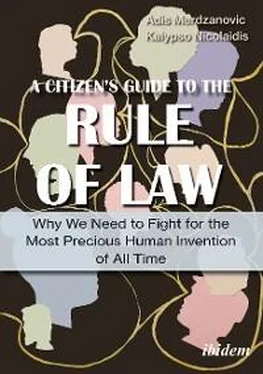In this book, we mostly focus on EU accession because it can teach us a lot about how the rule of law is established and what challenges it may face. The accession process is where the ideals of the rule of law, the practical challenges to it, and resistance to its implementation all coalesce into one. And the EU’s rule of law promotion efforts in this context can serve as our “proof of concept”. Everything we wish to say, can be said with the accession process as an example. But the ideas we put forward are applicable to all other contexts dealing with the rule of law, especially in EU member states. What we say matters, whether one lives in an EU member state or not.
The Twin Imperatives for the Western Balkans
Negotiating accession
Yugoslavia’s violent disintegration began in the early 1990s, when a number of wars among the former republics of the socialist confederation broke out. They would last for more than a decade and be fought with a brutality few had thought possible on the European continent after the experiences of the Second World War. The EU and its institutional predecessor, the EC, proved unable to prevent the outbreak of hostilities, and the self-proclaimed “hour of Europe” as an international actor turned out to be an empty phrase. 1
When the Yugoslav wars eventually subsided, the EU offered a “membership perspective” to the successor states of the former Yugoslavia as well as Albania, which had not been part of Yugoslavia, as it had done with Central and Eastern Europe states (CEE) after the fall of the Iron Curtain in 1989. Today, Croatia and Slovenia are full-fledged EU member states, while the remaining countries—Bosnia-Herzegovina (BiH), Serbia, Montenegro, North Macedonia, Kosovo, and Albania—are still engaged in the so-called accession process. These countries are usually referred to as the “Western Balkans” or the “Western Balkans six”. It’s somewhat of a cumbersome, political term that desperately avoids any kind of connection with the Yugoslav past, but it has become the norm, so we shall use it as well. Why complicate matters more than necessary, right? But we shall also throw Turkey in the mix occasionally, for what we are saying matters there as well.
To become full members, these six states (and Turkey) have to fulfil a set of conditions—known as “membership criteria” or the “Copenhagen criteria”. They have to align their legal, political, and economic systems to the bulk of EU legislation that already exists, the so-called acquis communautaire. Basically, the EU’s rulebook. If a country wants to join, none of its laws and rules may contradict what’s in the rulebook, the acquis . Accession is thus basically an exercise in reforming existing rules and laws to fit the EU’s standards. This is actually quite a one-sided process, as the EU sets the rules and the candidate countries have to follow. Some would say that’s unfair, and it indeed is; but we shall come to that in a moment. 2
As part of the accession process, EU negotiators have also sought to establish what they have called the “rule of law” in the accession countries. Yet, it has not really worked, despite their best efforts. Rule of law “reforms”—if one may so call the at times rather small legal changes to which the domestic political elites agree—are moving slowly, and at times hardly at all. Young people are leaving the region by the tens of thousands; economic prosperity is nowhere to be seen, while the political and legal systems seem inadequate to cater to what citizens deem important. That’s not just a feeling propagated by opposition politicians and civil society actors critical of Western Balkans governments. It’s a fact. 3Many of the former or current accession countries still struggle with serious rule of law challenges. The judiciaries are not independent and don’t deliver swift and fair justice. The policemen are corrupt, not to speak of the politicians who exploit state resources for their own benefit. 4In general, more than two decades after the EU’s rule of law engagement in the region began, these countries are quite far away from the ideal the EU has been promoting in the guise of “liberal democratic regimes”, the ultimate goal of accession.
In other words: the EU’s rule of law promotion has a serious problem. It lacks efficacy and sustainability, due in part to flawed understandings among at least some of those who are expected to promote it.
Yet, without sounding too grand, it is fair to say that the rule of law is especially crucial in this region whose stability depends on it. But why?
With the exception of Turkey, the accession process deals with post-communist and post-war countries, which have a particular legacy to confront. In previous systems, authority came from above, from either the party or the warlord, and it was allegedly dispensed for the good of some imagined community, such as the “nation” or the “working class.” In a democracy, however, political authority comes from below, from the people, or rather all the individuals constituting that society. It’s the individuals that provide the democratic system with what we call legitimacy .
Legitimacy is a big word, we know, and philosophers can discuss it forever—and they have. But it actually means something quite simple: a political system is described as “legitimate” when we, the citizens, think that there is an authority that has the right to set the rules that we have the obligation to obey. That’s basically it. For a system to be truly legitimate, it is important that citizens are convinced that they have to follow the rules regardless of the latter’s actual content , just because they respect the authority that made that rule. 5
But even when legitimate, authority requires checks and balances and this is what the rule of law is all about. It constrains the exercise of power over each and every one of us and by doing so, it
When do you say ‘yes’ to authority?
Maybe you had a say in how it was established—you elected your representatives in parliament who voted on the rule, for example the law to wear seatbelts. Or you respect the process by which the rule was adopted—everyone had a say, experts were consulted, the vote was free and fair, and so on. Or you agree with the outcomes the rule produces—for example, fewer deaths in car accidents, less crimes in the streets, or food that is safe to eat, and so on. Or all three of these reasons. So, if these conditions are fulfilled, we can say a state or political system is legitimate. If not, things can get ugly.
contributes to the legitimacy of a system. So, ultimately, it’s one of the corner stones for peace and stability in any society.
Breaches of the rule of law seem much more dramatic in states that are in the process of becoming democracies. It is something quite different if one’s rights are disregarded in a liberal society that increasingly becomes illiberal, or whether this happens in a transitioning society that so far never enjoyed the full range of liberal rights. It is in the latter case that the rule of law develops its full meaning and it is here that the “deep concept” of the rule of law we wish to promote must stand its ground. Don’t worry, we shall come back to the “deep concept” in due course.
However much you are convinced that the rule of law matters, it won’t have escaped your attention that we have performed a magic trick: we never said what precisely the rule of law is. Instead, we just offered some hints and fragments of a larger concept. We’ve created somewhat of an illusion for us all to believe in. It’s now time to give the trick away, even if this means we can never become members of London’s Magic Circle .
Читать дальше












